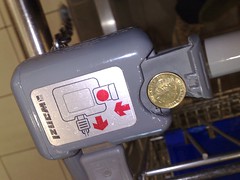 Some supermarkets require a deposit (usually a $1 or $2 coin) to get a trolley. Some don’t.
Some supermarkets require a deposit (usually a $1 or $2 coin) to get a trolley. Some don’t.
Personally I wouldn’t object if deposits were required universally, given the number of (almost always non-deposit) trolleys that get wheeled away, and end up in stupid places.
Hopefully it’d mean less trolleys get a wheel broken and are thus rendered unsteerable in what should be their natural habitat, supermarket aisles.
11 replies on “Trolleys”
They tried requiring deposits for trolleys in Lilydale, but had to stop because it meant when you were unloading your trolley into you car, you’d be surrounded by a small crowd of bogans asking, “Can I take your trolley back for you?” They were that desperate for the coins.
My mate bought a token at Aldi that he keeps on his keyring that is used as a “coin” for the slot in the trolley. That way he always has a “coin” with him to insert in the slot.
PS Vas, that happened to me once in Brunswick.
The trolleys at the SPC factory outlet in Shepparton require coins BUT people offer their own coin to you in exchange for your trolley.
This is a clever system that encourages one to put their cart/trolley back in the proper place for easy collection by staff. At US supermarkets the carts are usually scattered around the parking lot and often blocking parking spaces. They are often stolen too and in low income areas people can be seen happily pushing their carts full of groceries home as if they are doing nothing wrong.
Some supermarkets have installed a special wheel on one corner of the carts that will clamp down and immobilize the cart if it goes past the edge of the supermarket’s property. This does not deter some people and the locked wheel is pushed along wearing a flat spot in it. These carts then have a very annoying “thunk, thunk, thunk, thunk” as one pushes them through the market.
I don’t know if the coin system would be successful is the US as the largest coin anyone usually has is only a 25 cent quarter. Our 50 cent and dollar coins are rarely seen in circulation.
Most Americans are also amused with their first encounter with an Aussie cart/trolley as all four wheels swivel causing a loss of control going around corners. Carts in the US always have their rear wheels fixed.
Why don’t he have chips for trolleys. Some supermarkets have them.
That system works ok when the carpark is close to the store. In big malls where the carpark is miles from the store , it doesnt work so well.
@enno, I can’t think of a case where there isn’t a trolley return spot somewhere in the car park.
I have a cute trolley coin that lives on my keyring that I bought at a gift shop. You can get them is all sorts of designs, Google ‘trolley coins’.
Thats exactly the point.
With Aldi, to get your $2 back. You have to take the trolley all the way back to entrance of the store, in the middle of the mall.
So when you buy your groceries, its a ten minute walk to the car, unload the groceries, then ten minutes to take the trolley back, get the $2, and the ten minutes back to the car. So the ice-cream has an extra 20 minutes to melt in the boot of the car.
With coles or safeway you can leave the trolley in the carpark and the guy with the tractor will come and pick it up.
Aldi’s scheme might work at a standalone store site but it doesnt work very well when the store is buried in the middle of the mall, as it is at the two nearest to me.
Shopping carts in some parts of US are pre-programmed to go only a certain distance, let’s say till the end of the parking lot. It also has a built-in alarm that would sound off the moment you try to do something with the wheels. This is a great idea as no carts will be stolen, but it might be a little costly for the business owner.
You can always redeem your coins if you put the trolleys back to back and swap the chains.